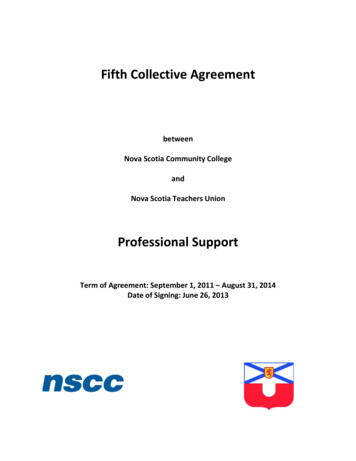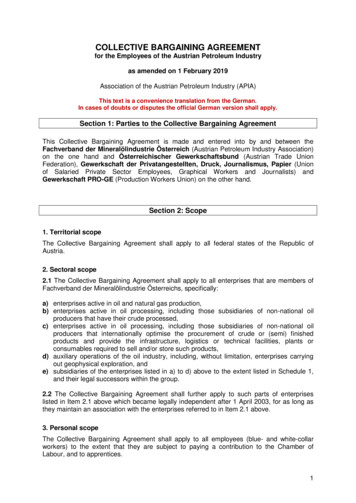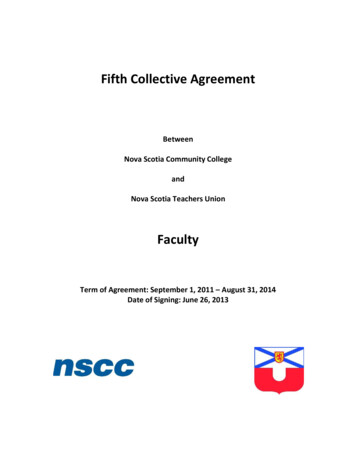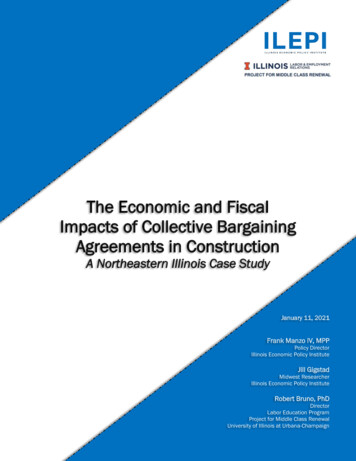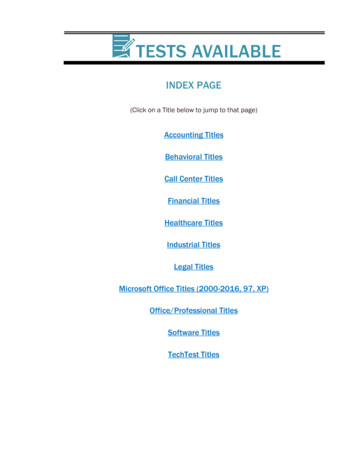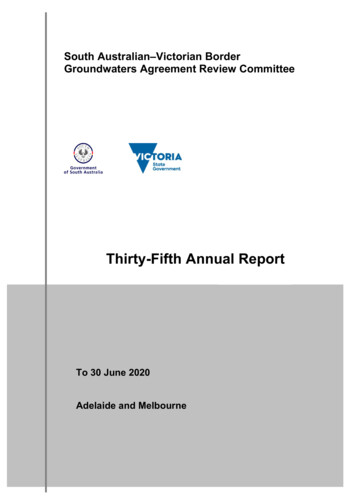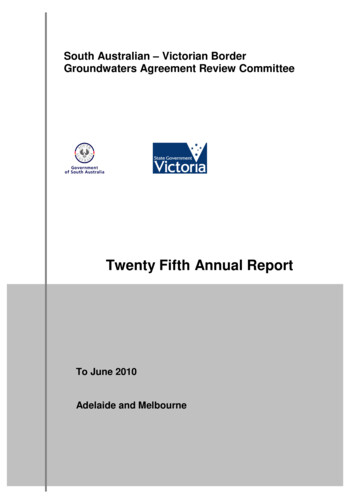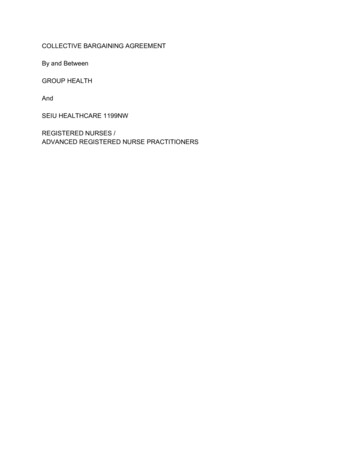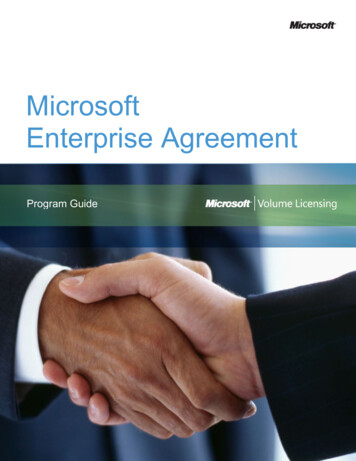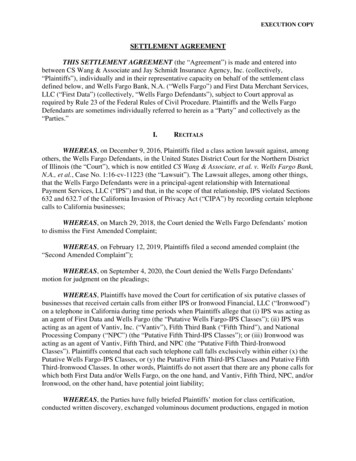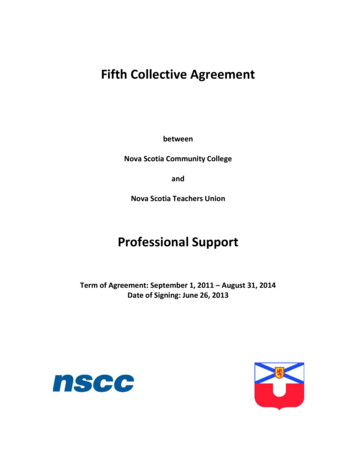
Transcription
Fifth Collective AgreementbetweenNova Scotia Community CollegeandNova Scotia Teachers UnionProfessional SupportTerm of Agreement: September 1, 2011 – August 31, 2014Date of Signing: June 26, 2013
Table of ContentsPREAMBLE4ADMINISTRATION OF AGREEMENT5Article 1: Definitions . 5Article 2: Recognition . 6Article 3: Application . 7Article 4: College’s Responsibilities . 7Article 5: Joint Responsibilities . 8Article 6: Existing or Future Legislation . 8Article 7: Harassment and Discrimination . 9Article 8: Union Information . 9Article 9: College-Union Committee. 9Article 10: Printing and Distribution of Collective Agreement . 11Article 11: Complaint, Grievance, and Arbitration Procedure . 11STAFFING17Article 12: Workplace Diversity . 17Article 13: Appointment and Termination of Employment . 17Article 14: Position Categories . 21Article 15: Status of Employee . 24Article 16: Reduced Assignment Plan . 30Article 17: Employee Exchange, Secondment, and Temporary Reassignment Opportunities . 32Article 18: Auxiliary Employees . 36WORKING CONDITIONS38Article 19: Duties . 38Article 20: Professional Development: Supporting Excellence in Teaching and Learning . 41Article 21: Employee Performance Review - Building Employee Success . 50Article 22: Professional Support Classification and Salary Plan . 51Article 23: Union Deductions . 53Article 24: Official Employment File . 53i
Article 25: Continuous Employment, Continuous Service, and Seniority . 56Article 26: Position Reductions, Lay-Off and Reinstatement . 60Article 27: Health and Safety . 70Article 28: Third Party Liability Insurance. 70Article 29: Legal Assistance and Protection . 71Article 30: Discipline . 71LEAVE74Article 31: Vacation . 73Article 32: Recognized Holidays . 77Article 33: Sick Leave . 78Article 34: Pregnancy, Parental, Spousal, and Adoption Leaves . 85Article 35: Bereavement Leave . 90Article 36: Special Circumstances Leaves . 90Article 37: Union Leave . 95Article 38: Leave for Union President. 98BENEFITS98Article 39: Retirement . 98Article 40: Re-employment Following Early Retirement . 100Article 41: Health and Welfare Benefits . 101Article 42: Deferred Salary Leave Plan . 102CONCLUSION104Article 43: Amendment . 104Article 44: Entire Agreement . 104Article 45: Term Of Collective Agreement105Schedule 1: Professional Support Classification and Salary Plan . 107Schedule 2: Service Award . 117Schedule 3: Public Service Award. 121Schedule 4: College Service Award. 123ii
Appendix 1: Vacation Entitlement Calculations . 125Appendix 2: Health & Welfare Benefits - NSTU Plan. 127Appendix 3: Injury on Duty and LTD (Public Service Superannuation Plan) . 130Letter of Understanding #1: Interpretation of Campus . 131Letter of Understanding #2: Community College Master Agreement . 131Letter of Understanding #3: Effective Date. 132Outline - Article 11: Complaint, Grievance, and Arbitration Procedure. 133iii
PreambleWhereas the Nova Scotia Community College is a post-secondary institution and is responsiblefor enhancing the economic and social well-being of Nova Scotia by meeting the occupationaltraining requirements of the population and the labour market of the Province by offeringeducation and training and related services for full- and part-time students,AndWhereas the College is committed to becoming a Learning-Centered College, its objective is toprovide the most learning-centered experience possible for students.AndWhereas it is the desire of both parties of this Collective Agreement to:(a)promote the well-being of Employees and students so that the people of NovaScotia will be well and efficiently served;(b)maintain harmonious relationships among the College, the Union andEmployees;(c)settle terms and conditions of employment among the College, the Union, andEmployees;(d)create an environment which values and respects all College staff, students andclients; and(e)recognize the value of joint discussion without diminishing any contractualprocedures or rights contained within this Collective Agreement;Therefore, the parties agree as follows:4
Administration of AgreementArticle 1: DefinitionsIn this Collective Agreement:Assignment means the assigned instructional and related duties of an Employee, as determinedby the College.Campus means an organizational unit necessary to provide administrative structure for thesupervision of instructional programs and services. For administrative purposes, an Employeeshall be assigned to a specific campus. For the purposes of this Collective Agreement, theCentral Office of the College shall be designated as a separate campus.Casual Person means any person hired to work nine (9) or fewer working hours per week and/orfour (4) or fewer consecutive weeks annually. Casual persons are not covered by the terms ofthis Collective Agreement.College means the Nova Scotia Community College, a Body Corporate, established pursuant tothe Community Colleges Act. The College is the Employer.Community College Education Diploma Program (CCEDP) means the College’s mandatoryeducational development program of which Employees must complete required courses as apre-requisite for consideration for appointment to regular status.Day means any twenty-four (24) hour period beginning at midnight, including Saturdays,Sundays and holidays.Employee means a person in the bargaining unit covered by this Collective Agreement.Employee Secondment means an assignment of up to thirty-six (36) months in anotherorganizational unit of the College or with an organization external to the College, where theEmployee may be performing duties of a comparable or different nature to those of theEmployee’s position.Exchange means an arrangement, approved by the College, whereby an Employee exchangesassignments with another Employee or other person employed by the College or a personemployed by an external organization for a period not greater than thirty-six (36) months.External Secondment means a temporary assignment of a person external to the bargainingunit to a bargaining unit position for a period not greater than thirty-six (36) months.Immediate Supervisor means a person, designated by the College, in a non-bargaining unitposition to whom the Employee reports.Leave of Absence means a period during which an Employee is absent from work with theCollege’s approval.5
Program means a course or group of courses that leads to the granting of a College or campuscredential.Province means the Province of Nova Scotia.Temporary Reassignment means an assignment in the bargaining unit created by and for theCollege for a defined and specific purpose and for a specific period of time for up to thirty–six(36) months.Union means the Nova Scotia Teachers Union.Working Day or Work Day means any scheduled day during which an Employee is assigned toperform duties by the College. Unless otherwise specified in this Collective Agreement, ascheduled day shall be within the period inclusive of the days Monday through Friday eachweek.Working Hour means an hour during which the College has scheduled an Employee to performassigned duties.Work Year means the academic year.Article 2: RecognitionExclusive Bargaining Agent2.1The College recognizes the Nova Scotia Teachers Union as the exclusive bargainingagent for the Professional Support Bargaining Unit.Bargaining Unit Exclusions2.2The Professional Support Bargaining Unit comprises all Professional Support Employeesemployed by the College. Professional Support Employees are employed primarily asnon-managerial professionals whose key responsibilities involve providing educationalsupport services of a non-instructional nature to students and/or staff. A ProfessionalSupport Employee may perform some tasks associated with management functionssuch as development of policy, budget preparation and administration, procuringmaterials, planning job priorities, assigning and coordinating work, participating in theselection process for hiring staff, and participating in the performance review process.Bargaining Unit Exclusions2.3The Professional Support Bargaining Unit shall exclude the following:(a)persons holding positions of President, Vice President, Principal, Dean, orAcademic Chair.(b)persons holding the positions of Manager, Director, or any other positionprovided such positions meet the criteria for bargaining unit exclusion as set outin paragraph (a) of subsection (2) of Section 2 of the Trade Union Act. RS, c.475,s.1.;(c)persons employed on a casual basis;6
(d)persons on secondment or exchange from an organization external to thecollege(e)persons employed by the College whose primary responsibilities are managerialin nature but who perform bargaining unit work on an occasional basis to:(i)meet operational requirements in emergency circumstances or in peakperiods; or(ii)enable bargaining unit members to participate in learning activities ormeetings off-site.Article 3: ApplicationParties Bound3.1This Collective Agreement applies to and is binding upon the Union, the Employees, andthe College. Those bound by this Collective Agreement shall carry out in a reasonablemanner the provisions of the Agreement.Article 4: College’s Responsibilities4.1The management and direction of all Employees and operations are vested exclusivelyin the College. All the functions, rights, power and authority which the College has notspecifically abridged, deleted or modified by the written, specific provisions of thisCollective Agreement or by amendments to this Collective Agreement made inaccordance with clause 43.1 are recognized by the Union as being retained by theCollege.4.2The responsibilities of the College include, but are not limited to, the following:(a)to hire, assign, promote, demote, transfer, evaluate, direct, lay off, discipline orterminate the employment of Employees;4.3(b)to plan and control all aspects of programs and services;(c)to establish and determine positions and vacancies, evaluate jobs, classifypositions, establish qualification requirements of Employees and specifyEmployees’ duties;(d)to change existing facilities;(e)to enforce such operational requirements as stipulated by legislation orregulation.It is agreed that the exercise of the responsibilities of the College is subject to theprovisions of this Collective Agreement and that the College shall not in the dischargethereof act in a manner contrary to any said provision.7
Article 5: Joint ResponsibilitiesNo Strike or Lockout5.1The College shall not cause a lockout nor shall Employees strike during the term of thisCollective Agreement.(a)Lockout includes the closing of a place of employment, a suspension of work ora refusal by the College to continue to employ a number of its Employees for thepurpose of compelling Employees, or of aiding another employer to compel itsEmployees, to agree to terms or conditions of employment.(b)Strike includes a cessation of work or refusal to work or continue to work byEmployees - in combination, concert, or accordance with a commonunderstanding - for the purpose of compelling the College to agree to terms orconditions of employment or to aid persons employed by other employers toagree to terms or conditions of employment.No Sanction of Strike5.2The Union shall not sanction, encourage, or support a strike by its members duringthe term of this Collective Agreement.Commitments Via Written Letter5.3The College and the Union shall respect the commitments made through theexchange of written letters during the collective bargaining process for this CollectiveAgreement.Article 6: Existing or Future Legislation6.1In the event that any provision of this Collective Agreement conflicts with any provisionof the Community Colleges Act or any other enactment, the provision of the CommunityColleges Act or other enactment shall prevail.6.2Neither the Union nor the College shall request the Governor-in-Council or the Ministerresponsible for the College to make changes to the Regulations pursuant to theCommunity Colleges Act which would have the result of nullifying or restricting theprovisions of this Collective Agreement without notifying the other party.6.3In the event that any law passed by the Legislature of the Province or any regulationmade pursuant to the Community Colleges Act renders null and void any provision ofthis Collective Agreement, the remaining provisions of this Collective Agreement shallremain in effect for the term of the Collective Agreement. The parties agree to attemptto negotiate a mutually acceptable alternative that is not inconsistent with the intent ofthe law or regulation for the provision which has been rendered null and void.6.4Where any law directly applies to Employees covered by this Collective Agreement andresults in greater rights or benefits than those contained in this Collective Agreement,such rights and benefits shall, at the request of either party, form part of this CollectiveAgreement and shall automatically accrue to the benefit of Employees covered by thisCollective Agreement.8
Article 7: Harassment and DiscriminationNo Discrimination7.1Neither the College nor any person acting on behalf of the College shall refuse toemploy or discontinue employment of any Employee, or otherwise discriminate againstany Employee in regard to employment or any term or condition of employment,because the Employee is or was a member of the Union or is or was exercising any rightunder this Collective Agreement or the Trade Union Act. R.S., c.475, s.1.7.2Neither the College nor the Union nor any person acting on behalf of either party shalldiscriminate against any Employee as specified under the Nova Scotia Human RightsAct. R.S., c.214, s.1.Policy and Procedures7.3The College shall establish and maintain a policy and procedures on harassment anddiscrimination.7.4The procedures shall include the process for handling complaints and investigations.7.5The College shall be responsible for communicating the Harassment and DiscriminationPolicy and Procedures to its Employees and the Union. Any changes to the Policy orprocedures shall include consultation with the Union prior to implementation.Investigation and Discipline7.6Should an Employee be the complainant or respondent in an investigation, theEmployee shall have the right to have Union representation at all meetings involving theEmployee. At the conclusion of an investigation, an Employee shall have the right togrieve any disciplinary action imposed by the College in accordance with Article 11:Complaint, Grievance and Arbitration Procedure.Article 8: Union InformationBulletin Boards8.1The College shall designate bulletin board space for the posting of Union noticespertaining to elections, appointments, meeting dates, news items, social andrecreational affairs.Union Literature8.2The College shall, where facilities permit, make available to the Union specific locationson its premises for the placement of bulk quantities of literature of the Union.Article 9: College-Union CommitteePurpose9.1A College-Union Committee shall be established consisting of up to two (2) Employeerepresentatives from the Union and up to two (2) representatives from the College oneof whom shall be the Vice President (Academic). If the Vice President (Academic) isunable to attend, a person who reports directly to the Vice President (Academic) shall9
be the replacement. Either party may have the assistance of a representative at anymeeting. The mandate of the Committee is to:(a)facilitate communications between the College and the Union during theduration of this Collective Agreement;(b)identify and resolve common problems during the duration of this CollectiveAgreement.Mandate9.2The College-Union Committee shall not have jurisdiction over salaries or any matter ofcollective bargaining, including the administration of this Collective Agreement. TheCollege-Union Committee shall not supersede the activities of any other committee ofthe College or of the Union and does not have the power to bind either the College orthe Union or its members to any decisions or conclusions reached in its discussions. ThisCommittee may make recommendations to the College and the Union with respect toits discussions and conclusions.Meetings9.3The College-Union Committee shall meet at a mutually agreeable date and time. Unlessotherwise mutually agreed, there shall be a minimum of three (3) meetings per year.These meetings shall normally be held during working hours. Matters for the proposedagenda to be discussed at any meeting shall be exchanged by the parties at least three(3) working days prior to the meeting.Release from Duty9.4Employees on the College-Union Committee may be released from duty without loss ofpay for the purpose of attending meetings of this committee. Such leaves of absenceshall not be unreasonably withheld recognizing, however, the need for efficiency ofoperations of the College.Expenses9.5Travel, meal and accommodation expenses for the Union representatives shall be paidby the Union. The College shall reimburse the Union for fifty percent (50%) of the travel,meal and accommodation costs incurred for the two (2) Professional Supportrepresentatives. Reimbursement of travel and meal expenses shall be in accordancewith College policy.Minutes9.6Two (2) copies of the minutes of each meeting of the College-Union Committee [one (1)for each party] shall be prepared and distributed to the Committee as promptly aspossible after the meeting. The College shall post approved minutes on the College’sourNSCC within five (5) working days following the next meeting of the Committee.10
Article 10: Printing and Distribution of Collective AgreementCopies of Agreement10.1The College shall provide an electronic copy of the Professional Support CollectiveAgreement on ourNSCC, the College website for staff.10.2The College shall provide the link to the electronic copy of the Collective Agreement toeach new Employee upon commencement of employment.10.3The College shall provide a reasonable number of copies of this Collective Agreementto the Union.10.4The College shall also provide a hard copy of this Collective Agreement to anyEmployee who so requests prior to the printing.Article 11: Complaint, Grievance, and Arbitration ProcedurePurpose11.1 (a)(b)The College, the Union and Employees recognize the desirability of promptresolution of complaints and grievances through an orderly process withoutstoppage of work or refusal to perform work. The process comprises threesequential stages: complaint, grievance and arbitration. Except as provided inthis article, the complaint stage is a prerequisite for proceeding to the grievancestage. The grievance stage is a prerequisite for proceeding to the arbitrationstage.Notwithstanding clause 11.1 (a), in extraordinary circumstances andsubject to the approval of the grievor, the parties may agree to bypass aninternal step or proceed directly to the arbitration stage.Complaint Stage11.2 For the purpose of reaching a solution through an informal process, an Employee whofeels unjustly treated by any action or lack of action by the College - including mattersthat meet the definition of a grievance in clause 11.4 - shall first discuss that complaintwith the Employee’s immediate supervisor. This shall be done not later than twenty-one(21) days after the circumstances giving rise to the complaint have occurred or of thedate the matter has, or ought reasonably to have, come to the attention of theEmployee. The Employee may have a Union representative present if so desired by theEmployee. The immediate supervisor’s response to the complaint shall be given notlater than fourteen (14) days after the discussion with the Employee.Grievance Stage11.3 The following may initiate a grievance:(a)an Employee on the Employee’s own behalf or on behalf of the Employee andone or more other Employees (in the latter case, all Employees on whose behalfthe grievance is submitted shall affix their signatures to the written grievance);(b)the Union;11
(c)the College;and, in so doing, shall be referred to as a “grievor”.Definition of Grievance11.4 A grievance is defined as a dispute in writing concerning the application, interpretation,or alleged violation of an article or articles of this Collective Agreement. A grievanceshall be submitted in writing and shall include a description stating the nature of thegrievance and the article(s) of this Collective Agreement that have allegedly beenviolated together with the redress requested. The grievance shall be signed by thegrievor and may be clarified by the grievor providing the substance of the grievance isnot changed. The reasons supporting the grievance shall be set out in the grievance.Additional reasons or article(s) of this Collective Agreement that have allegedly beenviolated that become known to the grievor subsequent to the submission of thegrievance may be added to the grievance at the time they become known to the grievorby notifying the respondent in writing at that time. The redress stated in the grievanceshall not limit the resolution that can be sought by the grievor. The lack of specificity ofthe reasons shall not, in itself, be cause for disallowing a grievance. In the case of anEmployee initiated grievance, the Union may act on behalf of the Employee at step oneof the grievance including signing the grievance when authorized by the grievor.Withdrawal of Grievance11.5 A grievor may withdraw a grievance at any step of the grievance/arbitration process bygiving written notice to the respondent. The respondent to an Employee-initiated orUnion-initiated Grievance is the College. The respondent to a College-initiated grievanceis the Union.Grievance Deemed Abandoned11.6If a grievor fails to initiate or process a grievance within the time limits prescribed in thisarticle, the grievance shall be deemed to be abandoned, and all rights of recourse to thegrievance and arbitration procedures under this Collective Agreement shall be at anend. If the respondent fails to reply to a grievance within the prescribed time limits, thegrievance may be processed to the next step. The parties may, by agreement in writing,extend the time limits, providing such extension is requested prior to the expiry of thetime allowed.Grievance: Employee-InitiatedGrievances Not Concerning Suspension, Discharge From Employment, or Lay-offStep 111.7 (a)If an issue is not resolved satisfactorily at the complaint stage and the complaintmeets the definition of a grievance stipulated in clause 11.4, the Employee shallsubmit the grievance in writing along with the redress requested to the SeniorHuman Resource Person of the College within forty-two (42) days after thecircumstances giving rise to the complaint have occurred or of the date thematter has, or ought reasonably to have, come to the attention of theEmployee.12
(b)Step 211.8 (a)(b)A person designated by the College to hear an Employee grievance shall arrangeto meet with the Union within the next fourteen (14) days at a time agreeable toboth the College and the Union. The Employee may have a Union representativepresent if so desired by the Employee. Within fourteen (14) days of suchmeeting, the College shall forward a written decision to the Employee and theUnion. If the grievance is denied, the response shall include the reasons for thedecision. Additional reasons that become known to the College subsequent tothe response to the grievance may be added to the response at the time theybecome known to the College by notifying the Employee and the Union inwriting at that time.If a grievance is not resolved satisfactorily at step one of the grievance stage,the Union, with the agreement of the Employee, may submit the grievance inwriting along with the redress requested to the Senior Human Resource Personof the College within fourteen (14) days of the receipt of the decision at stepone of the grievance stage.(i)A person (other than the person designated in step 1) designated by theCollege to hear an Employee grievance at step two of the grievancestage shall arrange to meet with the Union within the next fourteen (14)days at a time agreeable to both the College and the Union. Withinfourteen (14) days of such meeting, the College shall forward a writtendecision to the Union. If the grievance is denied, the response shallinclude the reasons for the decision. Additional reasons that becomeknown to the College subsequent to the response to the grievance maybe added at the time they become known to the College by notifyingthe Union in writing at that time.(ii)The Union may, at its discretion, have the Employee present at themeeting described in clause 11.8(b)(i).(iii)The timeframe for filing a complaint in accordance with clause 11.2 orgrievance in accordance with clause 11.7 shall be extended tocompensate for any absence by the Employee approved by the College,if so requested by the Employee.Grievances Involving Suspension, Discharge from Employment or Lay-off11.9 (a)An Employee who wishes to grieve the Employee’s suspension, discharge fromemployment or lay-off may submit a grievance in writing to the Senior HumanResource Person of the College not later than seven (7) days after receiving thesuspension or discharge from employment in accordance with clause 30.9 ornotice of lay-off. The grievance shall include the redress requested.(b)A person designated by the College to hear an Employee grievance involvingsuspe
5 Administration of Agreement Article 1: Definitions In this Collective Agreement: Assignment means the assigned instructional and related duties of an Employee, as determined by the College. Campus means an organizational unit necessary to provide administrative structure for the supervision of instructional programs and services.

